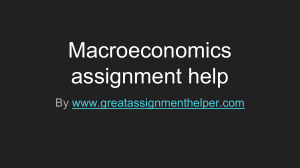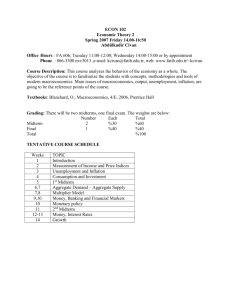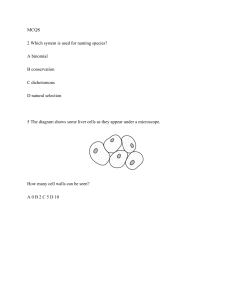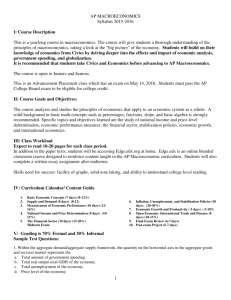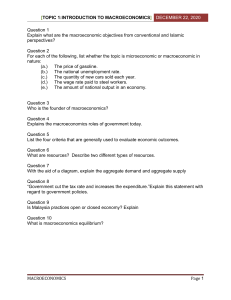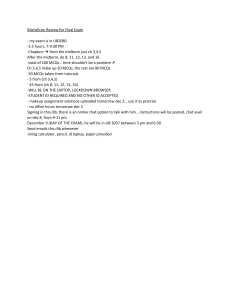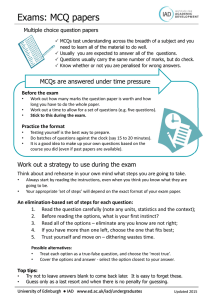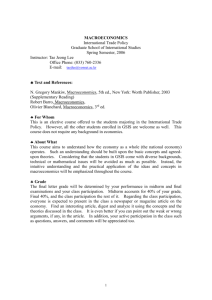APznzaZ8JKV1PT4mUCpgIjZK5Txyn-QHy-Gy3rnm8i1raYtPPdD7ngoMRGcaCfrz124MEDaK-9MsDr4eAr26r832NkHoQCjR0UFs7sbJEs2-9sePCmCuCU4bcZP1B09KfPQLAWvavN4MZm4lqpKqsHekcWfneOb ztztswkYGi-zjH1iLvm79EjJCWBmzpyXuX2HNo5Z0E-5
advertisement
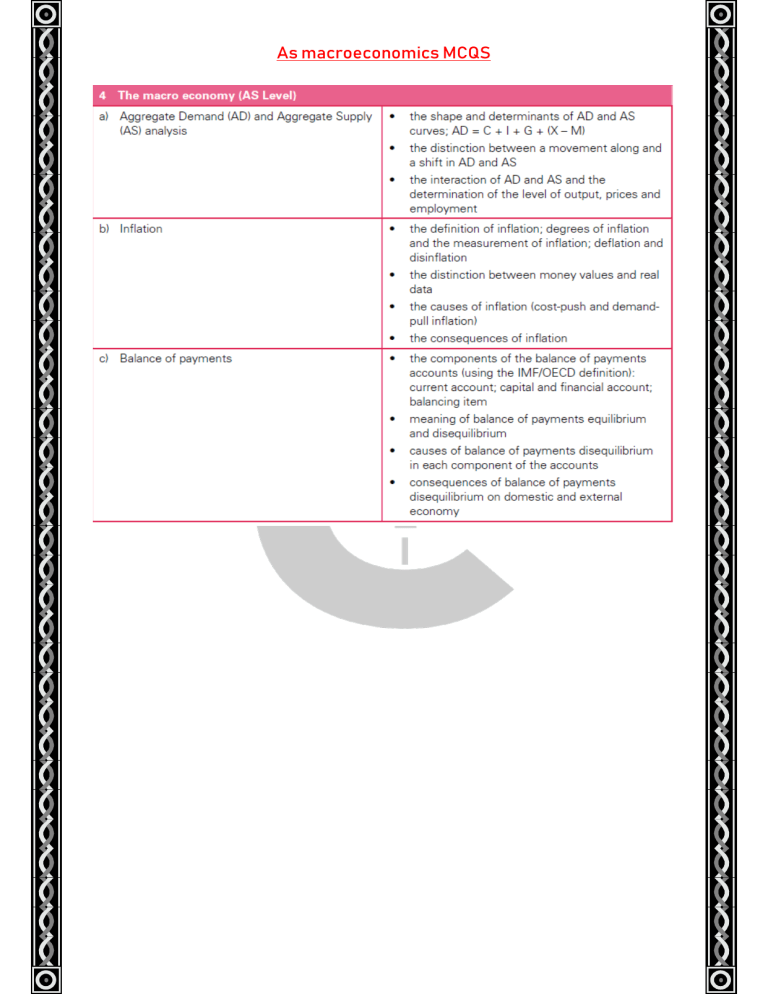
As macroeconomics MCQS As macroeconomics MCQS For more guidance, join https://www.facebook.com/groups/hbdumerkhan/ As macroeconomics MCQS Economics notes As Past papers Topicals Books Revision channel 1 Revision channel 2 Recent past paper questions AD/AS 1.How will an increase in government spending on infrastructure affect aggregate demand and aggregate supply? O/N19/11/20 2 The diagram shows the original aggregate demand curve, AD1, and original aggregate supply curve, AS1. The original equilibrium is at X. O/N19/12/20 What would cause the new equilibrium to be at Y? A an increase in export prices B an increase in government spending on education C an increase in import prices D an increase in the money supply As macroeconomics MCQS 3 The diagram shows the original aggregate demand curve, AD1, and the original aggregate supply curve, AS1. The original equilibrium is at X. What would be the new equilibrium if there is an increase in private sector investment and an increase in government spending on training courses? O/N19/13/20 4. 4 What would cause a shift in the short-run aggregate supply curve but not the long-run aggregate supply curve? A advances in technology B a change in the money wage rate C emigration of people of working age D gross investment exceeding depreciation M/J19/11/20 5 How can a change in consumption that increases unemployment be illustrated on an aggregate demand and aggregate supply diagram? M/J19/12/20 As macroeconomics MCQS 6 The diagram shows an aggregate supply curve, and aggregate demand curves. What would cause a decrease in aggregate demand from AD1 to AD2? A an increase in income tax B an increase in the price of electricity C an increase in the tax on goods D an increase in wage rates F/M19/12/23 7 The diagram shows an economy’s aggregate supply curve What is likely to cause the curve to shift to the left? A an increase in investment due to a reduction in interest rates B an increase in the marginal rate of income tax C improvements in technology D schemes to increase the geographical mobility of labour O/N18/11/20 As macroeconomics MCQS 8.The diagram shows a shift in the aggregate demand curve, from AD1 to AD2 What might have caused this shift? A a fall in the budget surplus B a fall in the trade surplus C a rise in imports D a rise in the interest rate O/N18/12/19 9 An economy has an equilibrium level of real output Y, but wishes to move towards its full employment level of real output YFE. Which combination of policy measures is most likely to achieve this wish without high inflation? A decreasing interest rates and raising investment in new technology B decreasing the money supply and raising corporation tax rates C increasing interest rates and raising income tax thresholds D increasing the money supply and raising welfare benefit payments O/N18/12/19 As macroeconomics MCQS 10 In its 2016 budget statement, the South African government proposed stimulating business activity by the removal of regulations. It also announced that government expenditure was expected to grow by 7.1%. The diagram shows aggregate demand (AD) and aggregate supply (AS) for the South African economy. X is the original equilibrium point. Which new equilibrium would result from the changes? M/J18/11/19 11 The diagram shows short-run aggregate supply and demand in an economy, where the initial equilibrium is at S. What is most likely to cause a movement from S to T? A an increase in consumer expenditure and an increase in productivity B an increase in consumer expenditure and a reduction in imports C an increase in education and training and an increase in income tax D an increase in the exchange rate and a reduction in corporation tax M/J18/12/19 As macroeconomics MCQS 12 What is both a valid statement and consistent with the features of the diagram? A AS cannot be increased beyond some level of real output. B Consumption is a component of AD and is lower when the general level of prices is lower. C Investment is a component of AS and is independent of the general level of prices. D The greater the demand for a country’s exports, the lower will be AD. M/J18/13/19 13 An aggregate demand curve slopes downwards from left to right. One reason for this is that a reduction in the average price level will lead to A a decline in the country’s international competitiveness. B an increase in interest rates. C an increase in the real value of money balances. D the expectation of further price falls. F/M18/12/19 14.The diagram shows the output of an economy. As macroeconomics MCQS Marking Key AD and AS 1.C 2.C 3.B 4.B 5.C 6.A 7.B 8.A 9.A 10.C 11.B 12.A 13.C 14.D As macroeconomics MCQS Inflation 1.What always happens when there is an increase in the Consumer Price Index? A an increase in consumer expenditure B an increase in the cost of living C a reduction in living standards D a reduction in real disposable income O/N19/11/26 2 The table shows the annual percentage increases in a country’s consumer prices index (CPI). 2.Which statement is correct? A Consumer prices, on average, fell throughout the period. B Consumer prices, on average, remained the same in 2016 and 2017. C The general level of consumer prices was at its highest in 2015. D The general level of consumer prices was at its highest in 2018. O/N19/12/22 3 The graph shows the rate of inflation for seven countries for 2015 and 2016. What can be concluded from this graph? A Prices in Costa Rica rose in 2015 but remained constant in 2016. B Prices in Ecuador and Mauritius were lower in 2016 than in 2015. C Prices in India and Malaysia remained constant in 2016 and 2015. D Prices in Thailand and Japan were lower in 2016 than in 2015. O/N19/13/21 As macroeconomics MCQS 4 What must be true if an economy is experiencing inflation? A Aggregate demand is increasing. B Aggregate supply is decreasing. C The interest rate is increasing. D The real value of money is decreasing. O/N19/13/25 5 The diagram shows aggregate supply and aggregate demand curves for an economy. What would cause a movement from X to Y? A a decrease in income tax and in the cost of production B a decrease in interest rates and increase in the cost of production C an increase in income tax and in the cost of production D an increase in interest rates and decrease in the cost of production M/J19/11/24 6 The table shows changes in the population, price level and Gross Domestic Product (GDP) of a country. What happened to real GDP and real GDP per head between year 1 and year 2? M/J19/11/25 As macroeconomics MCQS 7 An economy is experiencing a period of deflation. What must be happening? A The average price level is falling. B The output of the economy is falling. C The rate of inflation is falling. D The real value of money is falling. M/J19/12/25 8 The diagram illustrates what happens to aggregate demand (AD) and aggregate supply (AS) in an economy during a year. What explains the rise in the general price level? A boom in consumer spending B higher taxes on company profits C reduction in government-financed projects D rising costs of raw materials M/J19/13/18 9 How is a rate of inflation that is lower than that expected likely to affect lenders and borrowers in an economy? M/J19/13/19 As macroeconomics MCQS 10 What is likely to be the least effective store of value during a period of rapid inflation? A antique furniture B fixed interest government securities C houses D shares of industrial companies M/J19/13/26 11 The diagram shows aggregate demand (AD) and aggregate supply (AS) in an economy. Thi initial equilibrium is at point E. What causes shifts in the aggregate supply curve from AS to AS1 and from AS to AS2? F/M19/12/27 As macroeconomics MCQS 12 The diagram shows the change in an economy’s rate of inflation over 4 years. What happened to the general price level over the 4 years? O/N18/11/21 13 The table shows the consumer price index (CPI) and national output at current prices in 2014 and 2015 for an economy. What can be concluded when 2015 is compared with 2014? A Money national output decreased by 10%. B Money national output increased by 20%. C Real national output fell. D Real national output increased. O/N18/12/20 14 A country experiences a fall in the consumer price index. What must be associated with such a fall? A a decrease in average wage rates B a decrease in borrowing C a decrease in consumers’ expenditure D a decrease in the cost of living O/N18/13/21 As macroeconomics MCQS 15 What would be certain to cause a fall in a country’s cost of living? A a fall in real incomes B a fall in the inflation rate C a negative inflation rate D a reduction in direct tax rates M/J18/11/20 16 The table gives figures for household spending in the UK economy between 2008 and 2010. What can be concluded from the figures? A All households bought more goods and services in 2010 than in 2008. B Households saved more in 2008 than in 2010. C Living standards were lower in 2009 than 2010. D The rate of inflation was higher in 2010 than in 2009. M/J18/11/21 17 The diagrams show the inflation rate over time in four countries. Which country experiences a falling cost of living throughout the period? M/J18/12/20 18 A government statistical office measured changes in income from employment, pensions and benefits, then subtracted income tax and welfare contributions and adjusted for inflation. What did the final figure represent? A changes in nominal income B changes in nominal net earnings C changes in real disposable income D changes in real gross earnings M/J18/12/21 As macroeconomics MCQS 19 The average consumer divides his expenditure between food, clothing, accommodation and transport in the ratio 2 : 1 : 4 : 3. During the course of a year, the price of food falls by 2%, the price of clothing increases by 4%, the price of accommodation increases by 10% and the price of transport remains constant. Assuming that the weights of a price index reflect the expenditure of the average consumer, what is the increase in the index over the year? A 2.5% B 4% C 10% D 12% M/J18/13/20 20 In June 2016 the UK voted to leave the European Union. The table shows what happened to the value of the pound sterling before and after the vote. The UK is a major trading nation. What is likely to be the short-term impact of the changes in the value of the pound sterling on the UK economy? A increased disinflation B increase in cost-push inflation C more purchasing power of money D reduced demand-pull inflation M/J18/13/22 21 The table shows the CPI rate of inflation (%) in the United States from 2006 to 2013. What can be concluded from the figures about the period 2006 to 2013? A There was one year of constant prices. B There were three years of deflation. C There were only four years of inflation. D There were eight years of rising living costs. F/M18/12/22 22 The table shows a country’s consumer price index for March and April 2015. Which statement correctly describes what happened between these two months? A There was a decrease in the annual rate of inflation. B There was a decrease in real interest rates. C There was an increase in the purchasing power of money. D There was an increase in the standard of living. O/N17/11/20 As macroeconomics MCQS 23 What would be likely to increase inflation in an economy? A an increase in consumer saving B an increase in interest rates C an increase in labour productivity D an increase in taxes on imports O/N17/11/21 24 The table shows the retail prices index for four countries for years 2 and 3. (Year 1 index = 100 for all countries.) Which country had a higher rate of inflation in year 2 than year 3? O/N17/12/20 25 What would be likely to decrease inflation in an economy? A a decrease in consumer saving B a decrease in unemployment C an increase in labour productivity D an increase in taxes on imports O/N17/13/20 26 What is the average weighted price change illustrated by the table below? A –1.8% B 4.5% C 7.2% D 9.0% O/N17/13/21 27. A government succeeds in changing a current account deficit into a current account surplus. Why might this current account surplus increase the country’s inflation rate? A It raises aggregate demand. B It raises production costs. C It reduces the exchange rate. D It reduces the money supply. M/J17/11/21 28 Which statement about changing price levels is correct? M/J17/12/20 A Anyone on a fixed income has rising real income during deflation. B Government revenue from indirect taxes falls during inflation. C Producers prefer deflation to inflation. D Savers prefer index-linked savings when there is deflation rather than inflation. As macroeconomics MCQS 29. Which combination of events is most likely to cause inflation? M/J17/12/21 30. The table shows the year-on-year percentage changes for a country’s consumer price index from 2009 to 2015. Which statement about the price level is correct? A It fell over the first half of the period. B It was at its highest at the start of the period. C It was at its lowest at the end of the period. D It was at its lowest at the start of the period. M/J17/13/21 31 Relative weights are used in calculating the index of retail prices to reflect the different A amounts of money spent by consumers on each good. B levels of prices for each good. C numbers of people buying each good. D rates of change in price of each good over time. F/M17/21 As macroeconomics MCQS 32 The diagram shows the possible relationships between the degree of independence of the central bank and the level of inflation. Which relationship suggests that central bank independence is an effective way to reduce inflation? As macroeconomics MCQS Inflation 1.B 26.A 2.D 27.A 3.A 28.A 4.D 29.B 5.A 30.D 6.A 31.A 7.A 32.D 8.A 9.B 10.B 11.D 12.D 13.C 14.D 15.C 16.D 17.D 18.C 19.B 20.B 21.D 22.C 23.D 24.D 25.C As macroeconomics MCQS Balance of Payments 1 What is most likely to lead to a persistent surplus in a country’s current account of its balance of payments? A a low domestic savings rate B an undervalued exchange rate C highly protectionist policies by other countries D low investment income from abroad O/N19/11/22 2 A foreign government pays a UK university to educate its students.How would this be recorded on the balance of payments current account of the UK? O/N19/12/25 3 Which change is most likely to result in a worsening of a country’s balance of payments? A a reduction in remittances from citizens who work abroad B a rise in domestic rates of direct taxation C an expansion in the economy of a major trading partner D an increase in domestic interest rates O/N19/13/24 4 The table shows selected balances from a country’s balance of payments account in 2016. What was the country’s current account balance in 2016? A –$3 billion B –$10 billion C –$18 billion D –$20 billion M/J19/11/26 5 What is not an item in a country’s current account of its balance of payments? A exports of primary commodities B money received from banking services C overseas investment As macroeconomics MCQS D profits sent back by companies overseas M/J19/12/21 6 A British citizen buys a house in the US which he rents to American citizens in order to receive an income for himself. Where will the initial purchase and then the rent be recorded on the UK balance of payments? M/J19/12/26 7. An Australian family purchases a holiday to New Zealand and an Australian mining company sells coal to China. Four students, A, B, C and D, are asked where these transactions appear in the current account of Australia’s balance of payments. Which student is correct? M/J19/13/25 8 The table shows selected items of the balance of payments of a country in 2015. What was the country’s current account balance in 2015? A –$40 billion B –$30 billion C –$20 billion D –$10 billion O/N18/11/22 As macroeconomics MCQS 9 What is likely to explain an increase in the deficit on a country’s current account of the balance of payments? A an increase in government foreign aid to countries abroad B an increase in government tax rates C an increase in other countries’ exchange rates D an increase in the proportion of income saved by the country’s residents O/N18/11/23 10 Which item is not included in the current account of a country’s balance of payments? A exports of services B interest on foreign loans C profits from foreign investments D the purchase of foreign assets O/N18/12/22 11 The balance of payments accounts are arranged in the following way.Which total is the current account balance? O/N18/13/22 12 The table shows trade in goods and services for a selection of countries in 2005 and 2014 . What can be concluded about the balances of trade in goods and services from the table? A Argentina had a larger surplus in 2014 than in 2005. B Brazil had a surplus in 2005 and a deficit in 2014. C Ecuador had a deficit in 2005 and a surplus in 2014. As macroeconomics MCQS D Mexico had a larger deficit in 2005 than in 2014. M/J18/11/22 13 The demand for a country’s exports is price-elastic. What will be the effect of introducing export subsidies on its balance of trade and on its terms of trade? M/J18/11/27 14 The table shows all of the items on the current account of a country’s balance of payments. What is the value of the current account balance? A $5 m deficit B $10 m deficit C $13 m deficit D $3 m surplus M/J18/12/22 15 China had a US$155 billion current account surplus in 2012. Which combination of policies might the Chinese Government use to reduce the surplus? A decrease income tax and raise the value of the Chinese currency, the Yuan B increase income tax and lower the value of the Chinese currency, the Yuan C increase subsidies to Chinese firms and reduce income tax D increase tariffs on imports and increase income tax M/J18/12/29 As macroeconomics MCQS 16 The table shows an extract from a country's current account of its balance of payments accounts What is the value of export of goods, G, and what is the value of the balance of trade in services, H? M/J18/13/21 17 If an economy experiences a persistent balance of trade deficit, it may choose to place tariffs on imports of manufactured goods. When might the use of tariffs solve a balance of trade deficit in the long term? A when an economy imports a sustainable amount of raw materials B when an economy is experiencing a high rate of inflation C when the demand for imports is inelastic D when the supply of domestically produced goods is elastic M/J18/13/29 As macroeconomics MCQS 18 A country has a deficit on the current account of the balance of payments. Which policy would be expected to increase the deficit? A an appreciation of the exchange rate B an increase in domestic productivity C an introduction of import quotas D a rise in subsidies to domestic firms F/M18/12/29 19 What does the current account of the balance of payments include? A government reserves and foreign aid B government revenue and government spending C imports and exports of goods and services D inflows and outflows of trade and capital O/N17/12/21 20 When will a country’s balance of payments current account deficit be reduced? A when it lowers tariffs on its imports B when it raises its rate of income tax C when it removes export subsidies D when it revalues its currency O/N17/12/29 21 The diagram shows Greece’s trade position with the EU and Russia between 2005 and 2014. What happened to Greek trade balances over this period? O/N17/13/22 As macroeconomics MCQS Marking Key 1.B 2.C 3.A 4.B 5.C 6.B 7.C 8.B 9.A 10.D 11.C 12.B 13.B 14.A 15.A 16.A 17.D 18.A 19.C 20.B 21.C As macroeconomics MCQS Exchange Rate 1 An economy changes its exchange rate at time T. What does the J-curve diagram show happens at T and after T? O/N19/11/25 2 The tables show changes over a period in the average prices of a country’s exports and imports. They are expressed as index numbers, with year 0 as 100. What is the change in the country’s terms of trade index between years 1 and 2? A It improves by about 10%. B It improves between 4% and 5%. C It stays the same. D It worsens between 4% and 5%. O/N19/12/26 3 Which aim would be consistent with a government’s decision to buy its own currency in foreign exchange markets? A an appreciation under a freely floating exchange rate system B an appreciation under a managed float exchange rate system C a depreciation under a fixed exchange rate system D a devaluation under a managed float exchange rate system O/N19/12/27 As macroeconomics MCQS 4 An economy’s current account on the balance of payments is in surplus. The exchange rate is revalued by the government. Assume the Marshall-Lerner condition holds. Which diagram shows the impact on the current account balance? O/N19/12/29 5 What is the most likely consequence of an appreciation in the value of the Malaysian ringgit? A a decline in the level of unemployment in Malaysia B a fall in the rate of growth of the general price level in Malaysia C a reduction in the volume of imports into Malaysia D an improvement in the Malaysian balance of trade in services O/N19/13/26 6 Under which conditions will an appreciation of a floating exchange rate cause the current account of the balance of payments to worsen the most? O/N19/13/27 7 An economy experiences cost-push inflation. Which combination of policies would be best for the economy to use to reduce cost-push inflation? O/N19/13/28 As macroeconomics MCQS 8.What does the Marshall-Lerner condition state must be present for a depreciation of a currency to cause an improvement in the current account balance? A The price elasticity of demand for exports and the price elasticity of demand for imports are both greater than one. B The price elasticity of demand for exports and the price elasticity of demand for imports are both less than one. C The sum of the price elasticity of demand for exports and the price elasticity of demand for imports is greater than one. D The sum of the price elasticity of demand for exports and the price elasticity of demand for imports is less than one. M/J19/11/27 9 Under a system of floating exchange rates, what determines the foreign exchange value of a currency? A the overall supply of and demand for a currency on currency markets B the purchasing power of the currency relative to the purchasing power of foreign currencies C the surplus or deficit on the balance of payments on current account D the differential between domestic and foreign interest rates M/J19/12/27 9 The current account of the balance of payments for Nigeria changed from US$899 m in 2014 to US$ –15 763 m in 2015. Assuming that nothing else changes, what is likely to be the impact in 2015 on GDP and the exchange rate in Nigeria? M/J19/13/21 10 An Australian family purchases a holiday to New Zealand and an Australian mining company sells coal to China. Four students, A, B, C and D, are asked where these transactions appear in the current account of Australia’s balance of payments. Which student is correct? M/J19/13/25 As macroeconomics MCQS 11 The diagram shows the value of the Nigerian naira against the US dollar between June 2015 and June 2016. Which term is used for the change in the value of the naira in June 2016? A appreciation B depreciation C devaluation D revaluation F/M19/12/21 12 The diagram shows the determination of the floating exchange rate between the US$ and the UK£. D is the demand curve for pounds and S is the supply curve for pounds. The initial equilibrium exchange rate is E. Which change might cause an increase in the UK exchange rate? A a switch by US consumers from chocolate produced in the UK to chocolate produced in the US B a switch in the destination of UK tourists from Africa to the US C a wheat crop failure in the UK leading to increased wheat imports from the US D increased investment by US residents in financial and real assets in the UK O/N18/11/24 13 A government wishes to raise the value of the external exchange rate of its currency. What should it do? A discourage inward foreign direct investment B raise interest rates C raise the level of aggregate demand in the economy D remove quotas on imported products O/N18/12/23 As macroeconomics MCQS 14 Country X conducts 60% of its trade with country Y and 40% of its trade with country Z. The initial value of the trade-weighted exchange rate index of country X is 100. What will be its new trade-weighted exchange rate index value if its currency falls in value by 20% against the currency of country Y and rises by 10% against the currency of country Z? A 84 B 90 C 92 D 116 O/N18/12/24 15 In a country the Marshall-Lerner condition for an improvement in the trade balance is satisfied in the long run, but quantities of imports and exports are slow to respond to price changes. The government devalues its currency to reduce its trade deficit. Which curve indicates the probable behaviour of the trade balance? O/N18/12/29 16 The US central bank lowers its interest rate. This has an effect on the exchange rate of the US$. The diagram shows the resulting changes in the demand for and supply of US$ in the foreign exchange market. A change is shown by a move from a curve numbered 1 to a curve numbered 2. What should curves W, X, Y and Z be labelled to show the effect of the interest rate fall on the exchange rate? O/N18/13/23 As macroeconomics MCQS 17 The table refers to a particular country. Which statement about the period 2005 to 2015 is correct? A The balance of payments worsened. B The current account balance improved. C The exchange rate appreciated. D The terms of trade fell. O/N18/13/24 18 A newspaper headline stated that the Australian car industry has been affected by the strength of the Australian dollar. What would not be an effect caused by a strong rising Australian dollar? A Reduced foreign demand for Australian cars caused increased unemployment. B The price of exports of Australian cars became more expensive. C The price of foreign competitive cars became less expensive. D The price of imports of car parts became more expensive. M/J18/11/23 19 Following a long period of depreciation of the US$, both the US and UK monetary authorities raised their domestic interest rate. What will happen to the value of the exchange rate of the US$ in terms of UK£? A It will fall. B It will remain unchanged. C It will rise. D The outcome is uncertain. M/J18/12/23 20 Country P exports goods and imports goods. Export prices and import prices are set to an index of 100 in year 1. The table shows corresponding prices indices for years 2 and 3. Which statement is correct? A It is not possible to say how the terms of trade changed without further information. B The terms of trade improved between years 1 and 2, and improved again between years 2 and 3. C The terms of trade improved between years 1 and 2, and then remained unchanged between years 2 and 3. D The terms of trade worsened throughout the whole period. M/J18/12/24 As macroeconomics MCQS 21 In June 2016 the UK voted to leave the European Union. The table shows what happened to the value of the pound sterling before and after the vote. The UK is a major trading nation. What is likely to be the short-term impact of the changes in the value of the pound sterling on the UK economy? A increased disinflation B increase in cost-push inflation C more purchasing power of money D reduced demand-pull inflation M/J18/13/22 22 To what does the J curve effect directly relate? A balance of payment effects caused by exchange rate changes B exchange rate effects caused by balance of payment changes C import expenditure effects caused by tariff changes D trade creation effects caused by comparative advantage changes M/J18/13/23 23 Turkey can produce a good but also imports some of the good from Egypt. The Turkish currency depreciates against the Egyptian currency. How is this most likely to affect production of this good in Egypt and in Turkey? F/B18/12/24 24 In spring 2011 the US$ exchanged for 81.6 Japanese yen. In spring 2012 the US$ exchanged for 76.1 Japanese yen. What would be expected to rise for the United States (US) as a result of this change? A the level of unemployment B the price of US exports sold in Japan C the rate of imported inflation D the volume of imports SP16/01/24 As macroeconomics MCQS Exchange rate Marking Scheme 1. B 2. B 3. B 4. A 5. B 6. D 7. A 8. C 9. B 10.C 11.C 12.D 13.B 14.C 15.B 16.A 17.D 18.D 19.D 20.C 21.B 22.A 23.B 24.C As macroeconomics MCQS International Trade (TOT, comparative/absolute advantage and Protectionism) 1 The table shows the amount of good X or the amount of good Y that can be produced by country R and country T if each uses all of their resources. What can be concluded from the table? A Country R has an absolute advantage in producing good Y and a comparative advantage in producing good X. B Country R has an absolute advantage in producing good X and a comparative advantage in producing good Y. C Country T has an absolute advantage in producing good X and a comparative advantage in producing good Y. D Country T has an absolute advantage in producing good Y and a comparative advantage in producing good X. O/N19/11/21 2 The diagram shows Australia’s terms of trade per quarter from Q2, 2014 to Q1, 2017. In which period did Australia’s terms of trade decline and then improve? A Q2, 2014 to Q4, 2014 B Q1, 2015 to Q3, 2015 C Q4, 2015 to Q2, 2016 D Q3, 2016 to Q1, 2017 O/N19/11/23 3 What is not an example of protectionism? A the European Union (EU) requiring goods imported into member states to meet safety standards B the Pakistan government increasing the rate of goods and services tax, GST, on some exported goods from 2% to 5% C the Nigeria government banning the import of packaged sugar D the US imposing a 35% tariff on tyres imported from China O/N19/12/21 As macroeconomics MCQS 4 The table indicates the factor inputs required to produce wheat and cars in countries X and Y. What makes it possible for both countries to benefit from trade? A Country X has an absolute advantage in wheat and car production. B Country Y has an absolute advantage in wheat and car production. C Country Y has a comparative advantage in wheat production. D Opportunity cost of wheat and car production is the same between countries O/N19/12/23 5 The diagram shows the effect of a tariff on a product. From this diagram, what determines the gain the tariff generates for domestic producers? A the price elasticities of domestic supply and demand B the tariff rate and the price elasticities of both domestic demand and supply C the tariff rate and the price elasticity of domestic demand D the tariff rate and the price elasticity of domestic supply O/N19/11/22 6 The European Union consists of a group of countries with free trade between its members and a common external tariff on trade with non-members. What would weaken the operation of this customs union? A devaluation of any member’s currency B differences in wage costs between members C entry tests for seasonal migrant workers D one member country agreeing a trade deal with a non-member country O/N19/11/23 As macroeconomics MCQS 7 Industrialised countries X and Y trade with each other. Country X imposes a general tariff of 20% on imports from country Y. In which circumstances would the imposition of the tariff be unfavourable to country X? A if country X is seeking to protect its infant industries B if country X lacks the capacity to produce import substitutes C if imports from country Y have been dumped in country X D if imports of manufactured goods from country Y are price elastic M/J19/11/23 8: A country decides to remove all its tariffs and engage in free international trade What will be the final decision the country has to make before free trade takes place? A deciding which resources to allocate to the production of goods and services for international trade B deciding which goods and services should be provided for international trade C identifying the opportunity costs of production of goods and services which might be used for international trade D setting an appropriate exchange rate for the international trade of goods and services M/J19/12/22 9 The diagram shows the imposition of an import tariff. SW is world supply. SW + tax is world supply after the tariff is imposed. Which statement is not correct? A Domestic demand will fall from q4 to q3. B Imports will change from q1q4 to q2q3. C Imports will fall from q4 to q3. D Supply of domestic goods will increase from q1 to q2. M/J19/12/25 As macroeconomics MCQS 10 The diagram shows the effect of introducing an import quota on the market for good X. What is the change in domestic supply and the size of the import quota? M/J19/13/23 11 Country X joins a customs union with country Y and will remove the tariff on its imports of good M from country Y. Under which conditions will trade creation in country X be the smallest? M/J19/13/24 12 What will definitely lead to an improvement in the terms of trade? A Export prices fall whilst import prices rise. B Export prices rise by the same amount as import prices. C Export prices rise slower than import prices. D Export prices rise whilst import prices stay the same. F/M19/12/19 As macroeconomics MCQS 13 In the diagram Sd is the domestic supply of a product, Sw is the world supply and Dd is the domestic demand for the product After operating a free trade system the country bans all imports. What will be the effect on the revenue of domestic producers and world producers of the ban? . F/M19/12/20 14 Countries M and N produce the world supply of machines and textiles. The table shows what each country produces when it divides its resources equally between the two products What should happen according to the principle of comparative advantage? A Country M should produce both machines and textiles. B Country M should specialise in the production of machines, country N should specialise in production of textiles. C Country M should specialise in the production of textiles, country N should specialise in production of machines. D Country N should produce both machines and textiles F/M19/12/22 As macroeconomics MCQS 15 Two countries trade with one another without any forms of protection. They also impose a common external tariff on the imports from all other countries. What have these two countries formed? A a customs union B a free trade area C a monetary union D an economic union F/M19/12/24 16 The table shows the ability of two countries, P and Q, to produce two goods, Y and Z. Which statement is correct? A P has an absolute advantage in Z and Q has a comparative advantage in Y. B P has an absolute advantage in Z and Q has an absolute advantage in Y. C P has a comparative advantage in Y and Q has an absolute advantage in Z. D P has a comparative advantage in Z and Q has an absolute advantage in Y. O/N18/11/25 17 Which action increases and which action decreases the level of protectionism? O/N18/11/26 18 Country M imposes a tariff on imports of steel. Which price elasticity values will result in the smallest reduction in steel imports into M? O/N18/11/27 As macroeconomics MCQS 19 Two countries, Northland and Southland, produce two goods, food and drink. The table shows how many hours each has to use to produce one unit of each product. After specializing according to comparative advantage, they decide to trade. Which exchange rate will allow both countries to benefit from trade? A 1 unit of food to 2 1 unit of drink B 1 unit of food to 1 unit of drink C 1 unit of food to 2 units of drink D 1 unit of food to 3 units of drink O/N18/13/25 20 What is a characteristic of a customs union but not of a free trade area? A a common external tariff B a common tariff between member countries C fixed exchange rates between member countries D the abolition of all tariffs between member countries O/N18/13/26 21 In the diagram, Dd and Sd represent the domestic demand and supply curves for a product. Sw represents world supply of the product when there is free trade, at a world price of Pw. The initial domestic market equilibrium level of consumption of the product is at E. If a tariff of t were to be imposed, world supply would now be represented by Sw + tariff, at a price of Pw + t. O/N18/13/27 As macroeconomics MCQS 22 In the diagram, JK is a country’s production possibility curve. LK is its trading possibility curve which shows possible combinations of good X and good Y after specialising in the product in which it has comparative advantage, and then trading this product The country consumes OR of good X and OT of good Y. Which quantities of goods X and Y does it produce? SP16/01/26 23 What is the most likely aim of a government that increases the level of tariffs on imported manufactured goods? A a fall in interest rates B a fall in the exchange rate C a rise in domestic employment D a rise in the general price level SP16/01/27 As macroeconomics MCQS International Trade Marking Scheme 1. 2. 3. 4. 5. 6. 7. 8. 9. 10. 11. 12. 13. 14. 15. 16. 17. 18. 19. 20. 21. 22. A C B C D D B D C A C D B C A D A A C A A D Marcoeconmic intervention( policies ) not included.
